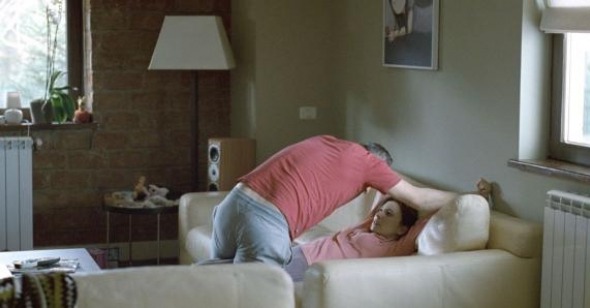Giving and Receiving
by Benjamin Mercer
Tuesday, After Christmas
Dir. Radu Muntean, Romania, Kino Releasing
None of Romanian filmmaker Radu Muntean’s films have yet seen commercial release in the U.S., but he’s one of his country’s most accomplished realists. His second feature, The Paper Will Be Blue, was a here-and-now recent-history drama in the Paul Greengrass mold, though less oppressively hectic, a topsy-turvy handheld portrait of collective confusion during the December 22, 1989, fall of president Nicolae Ceausescu. Life under Ceausescu—himself the subject of a caustic state-pageantry archival-footage “autobiography” playing outside the 2010 New York Film Festival’s main slate—has been a dominant topic of films from the so-called Romanian New Wave, whether tackled head-on (4 Months, 3 Weeks, and 2 Days) or as memory (12:08 East of Bucharest). Many recent films from Romania display a mordant sense of humor, but they are almost uniformly bleak, even the ones set in the present day (Stuff and Dough; Police, Adjective; and The Death of Mr. Lazarescu), showing a country still in institutional and infrastructural disrepair, and therefore implicitly pointing an incriminating finger backward at the dictator.
Muntean’s fourth feature, Tuesday, After Christmas, which he cowrote with Alexandra Baciu and Razvan Radulescu, is a domestic drama in its own way as harrowing as any of the above films, but it’s set against a backdrop of consumerist accumulation rather than systemic decay. In its tallying up of brand-name products and services—DHL, UPS, Heineken, McDonald’s, Casio, Pentax, and Barbie are among the many names dropped in Tuesday, set in the shopping-rush run-up to holiday in its title—the film offers up a decidedly upper-middle-class view of life in Bucharest. In this sense it raises the intriguing question of whether the “Romanian New Wave” would exist as a category at all if many of the country’s filmmakers declined to foreground the fall of communism—their “other Europeanness.”
Here, Muntean’s bourgeois milieu, of vaguely hip young adults who live in homes furnished with well-curated bric-a-brac, feels almost mischievously calculated to defy expectations, something further suggested by a late-in-the-film joke about a stray DVD of 12:08 East of Bucharest that Paul (Mimi Branescu) and a friend spy in the apartment of Paul’s mistress and then toss aside with a “what is this doing here?” snicker. Tuesday, After Christmas also couldn’t be more different from The Paper Will Be Blue aesthetically. The turmoil in Tuesday is personal rather than historical, private rather than public; instead of employing chaotic handheld, the new film is comprised of a series of long takes during which the camera moves very little or not at all.
Tuesday, After Christmas takes place in a compressed time period, a matter of days, as Paul spends time with both his wife, Adriana (Mirela Oprisor), with whom he has a daughter, and a younger woman, Raluca (Maria Popistasu), who is also his daughter’s dentist. Ralu knows about Adriana, but Adriana does not know about Ralu. Aside from a white-knuckle scene in which all the film’s major characters come together to wrangle over the child’s teeth in the sanitized-white of the dentist’s office (Ralu later refers to this as a “close encounter of the third kind”), the film mostly consists of Paul in extended conversations with one woman or the other; some of these scenes begin with the camera trained on Paul (shallow focus often isolates him visually) and his interlocutor off-screen, so it’s initially unclear whether his wife or his mistress is, in one discombobulating instance, asking him for a foot massage. Perhaps more tellingly, in a later scene, Muntean cuts from Paul picking up his daughter at a piano lesson to Paul milling about a bedroom. At first it seems like it might be his daughter’s room based on the previous piano-lesson scene—Paul looks restless, and it would make sense for him to wander about his daughter’s room in such a state, because he has just informed his wife of his affair and in the process irreparably broken their marriage—but soon we realize he’s in Ralu’s room, waiting for her. This brilliantly puts the viewer, however briefly, inside Paul’s confusion, the internal crisis otherwise masked by polite conversation about Christmas gifts.
Tuesday, After Christmas is an expertly performed and sharply observed relationship drama, but it is also something else extraordinary: a study of characters who have internalized the imperative of holiday gift-giving as a form of panic, as a compulsory way of keeping up appearances. In this sense it's more a film about capitalist accrual than the fallout from communism (perhaps this is why Muntean distances himself from reflective films about 1989 like 12:08 East of Bucharest). At every turn of Tuesday, After Christmas the emotional devastation is compounded by the deluxe stuff discussed: snowboards, CD box sets, telescopes, and synthesizers, items meaningless in themselves that nonetheless articulate a network of family and friends irreversibly unraveling. But this material weight always serves to underscore the personal cost, and it’s wrenching to watch this ten-year marriage almost instantly implode (“You’re my biggest disappointment ever,” Adriana tells Paul), leaving only uncertainty ahead, both for them and their young daughter.
